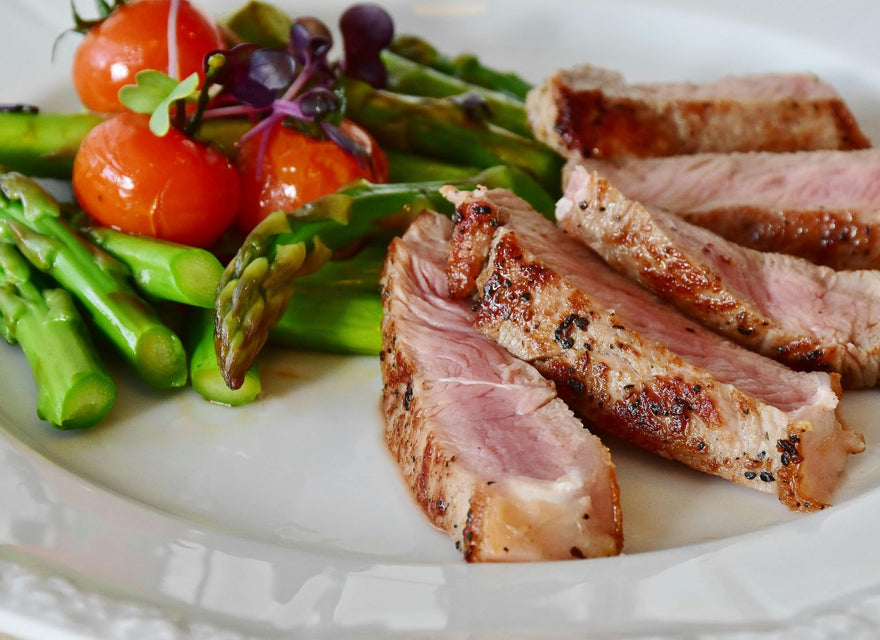
How Protein Impacts Hormones, Cravings, and Fat Loss
Most people don’t eat nearly enough protein, and it shows up in more than just their fitness goals. Protein is a foundational nutrient for hormonal balance, metabolism, and appetite regulation.
It is a very important nutrient, especially for those on a weight loss, gain, or maintenance journey. In this post, we will explore how protein impacts hormones, cravings, and fat loss.
How Does Protein Affect Fat Loss?

When you eat protein, your body burns more calories just to digest the food. It is like stoking a fire that keeps your metabolism burning hotter. It also keeps you full and satisfied for longer periods, helping you skip unnecessary snacks and stick to your goals.
While you're losing fat, this nutrient also protects your lean muscle, thus shifting your body composition. So, instead of getting “skinny fat,” your body becomes more toned and defined. It’s like sculpting from the inside out. Plus, if you’re actively weight training, it speeds up recovery, so you can hit the gym again and keep that fat-burning momentum going.
How Does Protein Affect Hormones?
Protein plays an important role in keeping your hormones balanced, which is essential for overall wellness. When you eat enough protein, it helps regulate ghrelin (your hunger hormone) while boosting hormones like peptide YY and GLP-1 that promote fullness and satisfaction. This helps prevent overeating and keeps your energy levels steady throughout the day.
This nutrient also supports insulin function, helping your body manage blood sugar more effectively, which is a big win for long-term metabolic health. It also aids in the production of hormones involved in mood, stress, and recovery.
A protein-rich diet helps your body stay in balance, supporting everything from fat loss and energy to mood and mental clarity.
Does Protein Stop Food Cravings?
Yes, protein can be a powerful tool against food cravings. When you eat protein, it helps stabilize your blood sugar and increases satiety hormones like peptide YY, making you feel full and satisfied for longer. This reduces the urge to snack or reach for sugary, high-calorie foods between meals.
In fact, meals high in this nutrient are known to curb late-night cravings and emotional eating by keeping your appetite in check throughout the day. So, if you're always raiding the fridge at night or struggling with sweet cravings, adding more protein to your meals might be the game-changer you need.
Benefits of Eating More Protein
Here’s why eating more protein might change everything, from the way you feel to how your body functions every day.
-
It Balances Blood Sugar
Think of protein as your blood sugar bodyguard. It slows the absorption of glucose into your bloodstream, preventing energy crashes, sudden cravings, and that post-carb slump. When your blood sugar stays steady, your mood, focus, and fat metabolism do too.
-
It Supports Lean Muscle Mass
Muscle is your body’s calorie-burning powerhouse. Protein helps you build and maintain lean muscle, which keeps your metabolism working even when you’re resting. And as you age, preserving muscle becomes even more important to prevent weight gain and loss of strength.
-
It Keeps You Full Longer
Ever eat a meal and feel hungry an hour later? That’s likely a low-protein problem. This nutrient triggers satiety hormones like GLP-1 and peptide YY, which tell your brain that you’re full. The result? You feel satisfied for hours, not minutes.
-
It Supports Estrogen Detox & Hormone Repair
Your body relies on amino acids (from protein) to build and break down hormones, including estrogen. Without enough protein, your liver and gut can’t detox hormones efficiently, which can lead to imbalances, bloating, fatigue, or stubborn weight. This nutrient keeps these systems running clean and smooth.
How Much Protein Should You Eat?

Doctors recommend you eat 0.8g of protein per kg of body weight. This means that if you weigh 75kg, you should be eating at least 60g per day. A great target is 20–30 grams of the nutrient per meal, especially at breakfast, when your body needs it most after fasting overnight.
What does that look like?
-
4–6 oz of chicken, tofu, or salmon
-
A scoop of clean protein powder in a shake
-
A cup of Greek yogurt with seeds and berries
-
Or a veggie omelet with a side of tempeh or turkey bacon
Bonus Tip: If you struggle with mid-day crashes or sweet cravings, look at your first meal of the day. Was it carby? Light? Or missing protein altogether? Your answer might be right there.
FAQs
Does eating more protein help you lose belly fat?
Yes, eating more protein can help reduce belly fat. It keeps you full longer, boosts your metabolism, and helps preserve lean muscle, which all contribute to the loss of belly fat.
What are the disadvantages of a high-protein diet?
A high-protein diet can be hard on your kidneys if you already have kidney issues. It may also lead to dehydration if you're not drinking enough water, and cause digestive issues like constipation if you're not getting enough fiber.
How does increasing protein intake aid in weight loss?
Protein helps you feel full, reduces cravings, and slightly increases the number of calories your body burns during digestion. It also helps preserve muscle while you lose fat, which is important for keeping your metabolism strong and active.
Wrapping Up
Protein isn’t just for bodybuilders; it’s for hormone health, energy, and stability. It helps your body function at its best, supports your metabolism, and keeps you feeling full and focused throughout the day.
Whether your goal is to lose weight, feel more in control of your hunger, or simply improve your overall health, this nutrient is a key player. So, when in doubt, eat the protein.